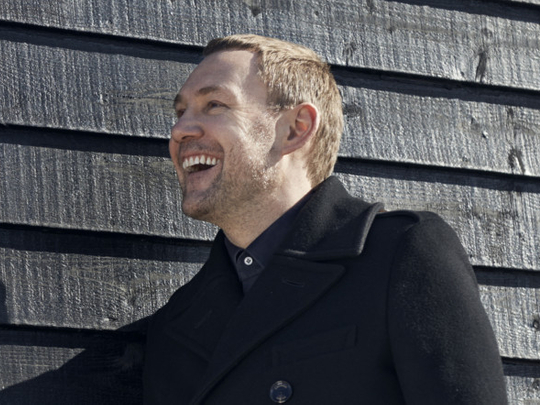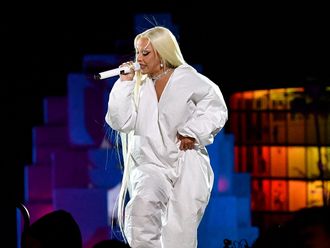
David Gray knows better than anybody what it’s like to be music’s nobody.
His first two records got him limited local attention in the early ’90s. They were acoustic folk before acoustic folk was cool (thanks Mumford and Sons and Ed Sheeran). His third album, a little more rock, a little more electronic, managed him some radio play in his home country of England — nice, but still no cigar, and no spot for Gray on the charts.
It wasn’t until his fourth record, White Ladder, came out — first in 1998 and then, under a new label, in 2000 — that Gray finally got a taste of commercial success. The album was No 1 in the UK — the fifth-best selling album of the noughties — and it’s still the best-selling album in Ireland to this date.
This Year’s Love, Sail Away, and his magnum opus, Babylon, were all Top 40 singles, with Babylon marking his first charted hit in America.
People were paying attention now. Gray didn’t particularly like it.
“Being famous was a bit of a trip,” he told tabloid! over the phone, ahead of his concert on February 25 at the Dubai Media City Amphitheatre. “I found it hard to deal with. It’s like an invisible foe — it’s impossible to fight it. You’ve got to go with it and find your own way.”
On the second night of the Emirates Airline Dubai Jazz Festival, Gray will be sharing a bill with Grammy-winning jazz musician Chris Botti (who Gray stutteringly dubbed “the trumpet player”) and Police legend, Sting. It’s a far cry from where Gray began, which he referred to as the “crap end of the whole thing”.
“There was no one there to see me. I played to nobody. I played to one person. I’ve been second on the bill to barbecued spare ribs — so barbecued spare ribs, sold-out; David Gray, nine o’clock,” he quipped.
Guitar strings breaking left, right and centre, a voice blown out by the fifth song; he didn’t possess the stage craft and subtlety he does today.
“I was just too much of a raw performer. I didn’t believe in jogging and warming up. I went straight into a sprint. These days, I have gears. I look after myself.”
Despite his rough beginnings, there are bright spots in his past that Gray still looks back on fondly, like his first visit to Ireland. Unbeknownst to Gray, he’d amassed a loyal following in the country after “some lads” gave his Babylon music video generous airtime on TV.
“When I got to this famous venue called Whelan’s at the back of a pub in Dublin, there was this massive crowd, and I just presumed it was for someone else’s show and I’d be playing on a smaller stage somewhere else,” he recalled.
“But they were there to see me, and I couldn’t believe it. There was a poet called Pat Ingoldsby who got up on the stage and gave everyone this big introduction — really bigged me up — and there was a bigger cheer for me going on the stage than I ever had going off one. I gave them absolutely everything.”
It would be easy to say that it’s all been smooth sailing for Gray since. At age 47, and despite a three-year, exhaustion-fuelled hiatus in 2002, Gray’s got ten albums to his name, the most recent being 2014’s Mutineers. He’s working on new music now and looking into releasing a few smaller EPs before putting out his next record in another year or two. But just like any artist who both craves and battles vulnerability, Gray has his struggles.
“When I get threatened, I generally go into my shell. I don’t rush out and buy a Ferrari or start sleeping with lots of different women, or whatever. I express myself by going back into myself and my music, sort of hiding from the whole thing,” he said.
“I’m in London at the moment, I’ve been working in my studio. Some days I have a great time and I feel like the world’s spinning perfectly for me, and other days, like yesterday, it was pouring with rain, everything seemed to be going wrong, the guitar amp blew up, strings breaking, songs weren’t coming together.
“You start from zero each time you do a new project — the same challenges await you. There’s no right to make music just because you’ve made it before.”
For Gray, reinventing himself is not a question of if but when, and involves asking himself what he has to say that’s different from all the things he’s said before.
“The call that music makes on you is to open your heart, and you really know when it does happen, because you can feel it when the hairs at the back of your neck are standing up. That’s what great music is about. You can’t be safe about it; you have to open the doors and it hurts to open up. But then, maybe, something will happen.”
Gray mused that today’s mainstream music has become “generally incredibly dull” — he’s more of a back-to-classics kind of guy. When David Bowie died in January, Gray took to his sparsely updated Twitter to commiserate the loss.
“I think he’s one of the biggest artists in popular music history. He’s right up there with the Beatles and the Stones, he was so influential. He wasn’t as big commercially as they were at the time, but his influence is really, really stretched out. He was capable of keeping his ears open and not being defeated by the new,” said Gray.
“I had a very personal moment with him backstage at Glastonbury when things were going crazy for me in about 2000. I had a really brilliant conversation with him. That’s something I held dear and when he died, I put a photo up that someone sent me of that moment. That was the reason I joined in on my social media, which isn’t the usual outlet for me to say anything.”
If Gray didn’t get into Tweeting, Facebooking, Snapchatting and Instagramming his every moment in 2015, he certainly won’t be doing so in 2016. What does he want out of the next 10 months, anyway? “Peace and quiet and the ability to work and really stretch my ideas out and enjoy my life. That’s something I don’t think I do enough.”
*Tickets, from Dh395, are on sale now at ticketmaster.ae and 800-TM-UAE.













